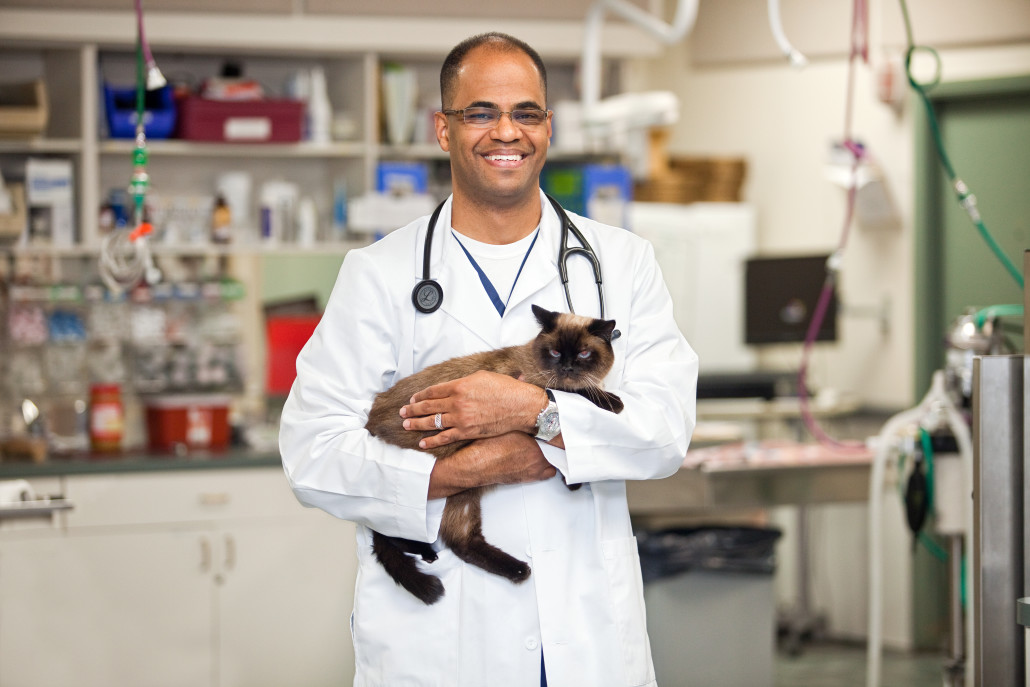The Hyperthyroidism Treatment

Hyperthyroidism Treatment
What is radioactive iodine (I-131)?
Radioactive iodine (I-131) is an isotope that has been used for the treatment of hyperthyroidism in both humans and felines for more than 70 years and more than 30 years, respectively. It is considered the ideal treatment for hyperthyroidism. The iodine is given by a subcutaneous injection in cats, and over a short period of time, destroys the abnormal hyperplastic tissue and makes the patient euthyroid (normal thyroid levels).
Treatment
Treatment with I-131 is safe and effective. It is one injection under the skin, much like a routine vaccine. The I-131 is absorbed quickly into the bloodstream and the diseased thyroid tissue. Once in the thyroid gland, it destroys the overactive portions of the gland, and the radiation is released through the urine, feces and normal decay.
A short stay (24-72 hours) in the I-CAT facility is required by law until the level of radiation is acceptable.
There are three most common treatment options; here are the advantages and disadvantages of each:
Tapazole
Advantages:
Oral medication
Cheaper short-term option
Short-term and long-term options
Disadvantages:
Controls but does not cure disease
Oral medication
Side effects seen in 20-25% of cats include lethargy, liver disease, vomiting and diarrhea, facial itching and scabbing, and bone marrow suppression
Expensive long-term
Surgery
Advantages:
Long-term option
Disadvantages:
Increased upfront cost
Surgical side effects including hypocalcemia (low calcium), laryngeal paralysis and anesthetic risk
Ectopic tissue
Hospitalization
Often need more than one surgery with recurrent disease
Radioactive Iodine Therapy
Advantages:
Effective cure with one subcutaneous injection in 95-97% of patients
Minimal side effects
Cheapest long-term treatment
Disadvantages:
Hospitalization (generally 1-3 days)
Upfront cost
Are other treatment options available?
Iopanic Acid – An iodinated contrast material has been used orally to suppress the conversion of T4 into T3. This option worked best in mild to moderate cases versus those with severe long-standing disease. This medication needs to be compounded for use. No long-term studies are currently available for this medication.
Are there any contraindications to treating hyperthyroidism?
The most significant concern is unmasking underlying renal disease, which although unlikely is a potential side effect with any treatment option.
Why is renal failure potentially worsened by treating hyperthyroidism?
Blood flow to the kidneys is increased in hyperthyroid patients and this promotes the function of the kidneys. Because renal insufficiency is seen in older felines, the increase in blood flow secondary to the hyperthyroidism essentially improves the function at least for the short term. When these patients are treated for their hyperthyroidism and the blood flow to the kidneys decreases or normalizes, the function of the kidney worsens. This is often reflected in an increase in both blood urea nitrogen (BUN) and creatinine and a decrease in urine-specific gravity. Generally this decrease in function is not clinically a problem, however, a small percentage of cats become clinical for their renal diseas
Post-Treatment Precautions
Although radioactive iodine is safe to treat hyperthyroidism, because it contains radioactivity, there are precautions that must be taken after therapy. Because the radioactivity is primarily excreted through the urine, feces and normal decay of the iodine, our main concern is the litter box. We recommend a clumpable, flushable litter and scooping the box at least once a day and flushing the clumps down the toilet. This procedure only needs to be done for the two-week period post-therapy.
Other precautions over the next two-week period include: keeping your pet indoors, limiting contact with your pet (avoid sleeping with your cat), and washing your hands after extensive contact with your cat, food bowls and litter box. It is very important that anyone under 18 years of age or anyone pregnant or trying to get pregnant not be involved in the care of your cat.
After two weeks, you can return to the normal care of your cat.
Prognosis
Radioactive iodine effectively cures hyperthyroidism 95-97 percent of the time with only one injection. Of those cases with persisting problems, a second injection is often effective.
Risks
Possible but uncommon complications include renal insufficiency, hypothyroidism, sore throat or dysphagia.
